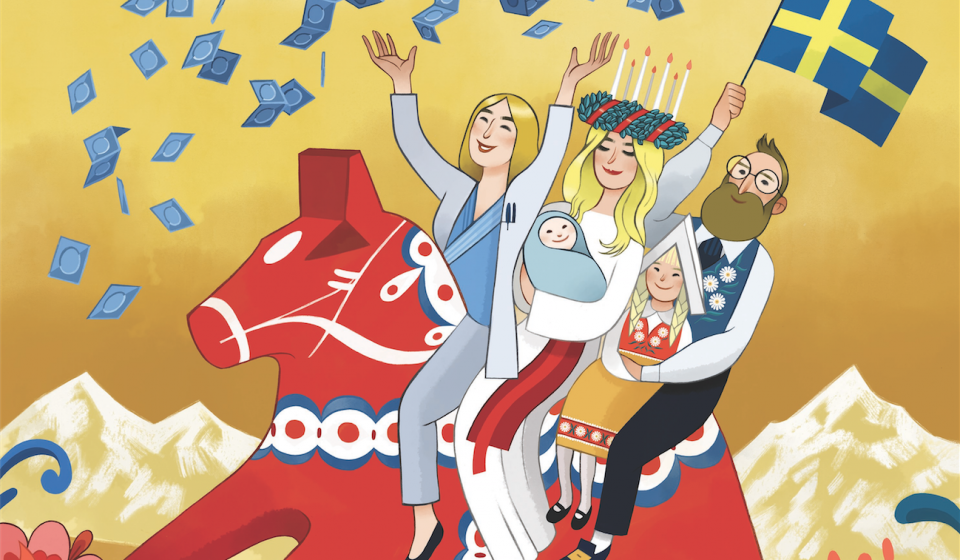The Big Short shows the big picture of how America’s financial system truly operates—and how more crises are...

Art by Caitlin Kuhwald
I came to Sweden to research reproductive freedom. I wanted to study family policies in a country where citizens get 480 days of paid parental leave and up to six weeks of annual paid vacation and where, I had heard, the government mails birthday greetings and condoms to young people when they are considered old enough to have sex.
When I left the United States, where I am a home-birth midwife and an advocate for women’s autonomy, reproductive freedom, and healthy families, the seemingly intractable conflicts over abortion, sex, and “family values” were raging. I thought getting out of the country might give me different perspectives and maybe even hope.
The first thing I notice, as a mother and midwife landing in Sweden, is the extraordinary attention paid to families. I discover that the narrow parallel tracks running up staircases, indoor and outdoor, are for strollers. I see strollers and wheelchairs everywhere, fitting into inviting and welcoming (beyond merely accommodating) public spaces. Every urban neighborhood has a grocery store stocked with real food that by law contains no unnecessary antibiotics, added hormones, corn syrup, or endocrine disrupting chemicals. Every neighborhood has a local health clinic and youth center.
There are no window decals prohibiting handguns, because Swedes don’t carry them. (It is illegal for a civilian to carry a firearm here unless for a specific, legal purpose, such as hunting or attending a shooting range.) A public bench seems to pop up whenever my dysplastic hip needs one. Dedicated bike paths abound. I marvel at how cars stop for pedestrians and bikers at every zebra crossing, and it almost makes me weep. I have seen cars hit bikers and pedestrians in America, and an eleven-year-old boy was killed recently along the very same traffic corridor where my son walked to school (and about which neighbors and I complained for years). This feels bigger than family friendliness. This is flesh-and-blood, money-where-the-mouth-is striving for humane and inclusive quality of life.
I say “striving” because democracy is a dizzying business, riddled with argument and debate. The American in me balks at the 25 percent value-added tax, higher even than Norway’s, as well as the “rules are rules” mentality that drives Swedish behavior. I cannot count how many times I’ve been told, “regler är regler.” For the first time in my life, I have been pulled over by police and asked to blow into a breathalyzer. And I never, ever fail to come to a dead halt at stop signs, because even on a vacant road there can be a traffic camera, and fines are steep.
But the American in me decides she is happy to pay high taxes and play by Swedish rules on the first day of public school.
My son’s teacher said he did not need to bring anything apart from his curious, well-rested, breakfasted self. School will supply all his school needs, including an iPad and hot meals made from scratch. His first lunch —eaten over an hour at a round wooden table, sitting on a real wooden chair, in an actual dining room filled with windows and art—is baked salmon in rich cream sauce, dilled potatoes, steamed broccoli, salad with homemade dressing, bread, butter, and organic milk, served in all-you-can-eat buffet style. The kitchen uses 30 percent organic ingredients, locally produced when possible. My seventh grader is disoriented but delighted by trusting adults and an open campus with unlocked doors. (Every morning since Sandy Hook, my son’s school in America was all locked up by the time the kids were reciting the Pledge of Allegiance.)
Three weeks after school starts, teachers, parents, and students in my son’s class, all on a first-name basis, come together with the principals and play party games. Torsten and Kirsten, the co-principals, also show us a short new film about teenage brain development and apply it to teen relationships, screen time, food and beverage choices, exercise, and sleep. They tell us why there is zero tolerance for bullying, graffiti, and energy drinks and about the variety of skilled and safe on-site adults to whom our teens can turn. All evening, not a single condescending or disparaging word about adolescence is said or implied. Not a sign of weary adult forbearance is exhibited. We walk home feeling connected and energized.
With my child happy, settling into a school with which I could not feel more satisfied, I am free to go to work. I devour library articles and books and begin scheduling interviews.
A surprisingly moving, autobiographical comic book called It Grows: An Illustrated Story of Abortion and a simple story by a youth social worker called The Secret teach me in grounding terms how sex education, contraception, and abortion work in Sweden. Any Swedish teen or adult can walk into one of the common health centers and talk confidentially with a counselor or midwife about any personal or social issue or need, including pregnancy. She or he probably will already have been introduced to a youth health center on a school class field trip at age twelve or thirteen.
Youth and young adult health centers in Sweden offer a limitless supply of free condoms, free testing and treatment for chlamydia and other diseases, and free emergency contraception. Pregnant minors are encouraged but not required to involve a parent. Counselors and/or psychiatrists meet with girls and are available to all women. Abortion is free or low-cost and available on-demand up to eighteen weeks of pregnancy. A dating ultrasound is required, and if the pregnancy is earlier than three months, girls and women can choose between vacuum extraction or pill-induced abortion and to complete the abortion at home.
Abortions are performed up to twenty-two weeks of pregnancy, but after eighteen weeks there must be a medical indication and a psychiatrist is involved. All girls and women are encouraged to include support persons. Midwives, who are prescribing professionals associated with health and wellness, support all girls and women through normal pregnancy and birth, as well as contraception and abortion choices.
Records from ancient times to the present day indicate that women tend to prefer coping with unwanted pregnancy privately and using measures within their control, or within a circle of trusted family or friends. Preference for autonomy and privacy is evidenced even when clinic-mediated options are accessible. Thanks in part to research at Sweden’s Karolinska Institutet, home abortion is now predictably safe and effective. For women from Stockholm to Nairobi, it has become a first-choice abortion method.
America stands as an exception. For American women, politically driven drug restrictions, costs, and lack of funding for education and support make obstacles to home abortion formidable.
The week I left home, one of my heroes in the struggle for women’s reproductive freedom died. Anne Gaylor, a great American visionary and freethinker, quietly helped thousands of women get safe abortions before Roe v. Wade became the law of the land. What began as a living room telephone support, education, and referral service connecting women and abortion providers in New York and Mexico grew into America’s first private donor fund dedicated to helping women pay for abortions. Anne’s work in reproductive freedom caused her to go on to found the Freedom From Religion Foundation.
Today, anti-abortionists in America continue to shape private and public discourse about abortion and erect ever more sophisticated barriers between women and empowering reproductive health care. Were it not for the tireless volunteers at Anne Gaylor’s Women’s Medical Fund, girls and women in my home state of Wisconsin might as well live in the pre-Roe v. Wade era. Anne summed it up this way: “Without the choice of abortion, women can’t be free.”
In Wisconsin, where I have attended births for over two decades, first in a hospital and then through my own home birth practice, women have begun contacting me for home abortion help. I helped them or someone they know through arguably greater risks, choices, responsibilities, and pains of pregnancy and birth. Can I help them end an unwanted pregnancy? The question seems perfectly natural.
Like all midwives, I have routine access to misoprostol, one of the two needed abortion pills and which cost me exactly ninety-eight cents apiece. But by most state laws, including my own, a doctor must deliver the pills. In Wisconsin, at least twenty-four hours prior to the abortion, a physician trained in surgical abortion must read a state-drafted script and perform or review a detailed ultrasound in the presence of each girl or woman, exactly as specified and mandated by the state. The girl or woman must attest by signature that these letters of the law were obeyed.
Can I go with to Planned Parenthood, then, to be a support person in the process? Planned Parenthood does not allow doulas, for safety reasons, I’m told. Security is a serious issue. A nurse practitioner friend tells me she still hears, “He’s got a gun! He’s got a gun!” ringing in her ears from the day in the Planned Parenthood parking lot when (in a twist of abortion history) a man pulled out a loaded pistol and killed himself. His ex-girlfriend was having an abortion there that day.
At another Wisconsin clinic, an ever-present picketer dooms to hell everyone entering and exiting, while capturing them and their license plates on videotape. Some clinic staff regularly wear disguises, bullet-proof vests, and drive only rental cars to work. Some even choose not to vote, in fear of making their home addresses discoverable. An abortion physician friend of mine reports her relief whenever quiet, ho-hum picketers greet her in the morning. Such a state of affairs and worse, spanning the last four decades in America, is incomprehensible to the Swedes I interview.
“Publicly protesting abortion or anything related would be seen as hysterical in Sweden, not even the Christian party would do that!” says Ella, a twenty-eight-year-old hospital gynecology nurse who plans to continue studies to become a midwife.
Ella, who lived in Australia and traveled extensively, speaks excellent English. She is a Stockholm native and unmarried, until recently had a long-term partner, or “särbo,” meaning unmarried partner living separately. This term is to be distinguished from “sambo,” meaning unmarried live-in partner. Ella plans to have children when she meets the right man.
University tuition is free for Swedish citizens, daycare and preschool are subsidized, and every Swedish child receives a monthly stipend from the government of about $125 until age sixteen. Therefore Ella does not feel pressure to establish herself in her chosen profession before starting a family. She has never had an abortion and uses an IUD for contraception. “But most people use condoms until they know each other really well or are in a long-term relationship.” She adds, “I would say Swedish parents tend to be older. Families tend to be smaller.”
She tells me health professionals in Sweden are not allowed to “opt out” of supporting or prescribing emergency contraception or abortions. “This was actually tested recently by a midwife who wanted to refuse to prescribe abortion pills. She asked the Christian Democrat party for help. But the official ruling decided she had to perform her job properly, according to her job description, or find a different one.”
Rules are rules.
What about picketers, threats, sabotaging tactics of the type used in America? Ella has no knowledge of any such activities. “It would be on the front page of all the newspapers for a week,” she says. Sonja and Anneli shake their heads vigorously when I ask them the same question. “Never, women in Sweden will never go backwards that way,” Sonja says. “That would be crazy!”
Sonja is a single, dynamic, forty-one-year-old actress from Kiruna, a “small, man-dominated mining town” in the far north of Sweden. Anneli is a fifty-six-year-old writer, mother of three adult children, and new grandmother from southern Sweden who fills the room with maternal warmth. “Abortion isn’t controversial in Sweden, you know, because most Swedes do not have a religious belief against it,” Anneli says.
I ask Anneli and Sonja how they feel about pill-induced abortion, which American abortion opponents have been working particularly hard to suppress. Anneli says two of her children have had pill-induced abortions. “Pill abortion is at home, a woman’s body does it. It’s hard, but it’s meaningful. Everybody chooses this now unless it’s too late.” She felt proud of her children’s partners, who showed strength in unity and support. In her mind, the partners had passed a sort of test for partnerhood and parenthood. Of her own history with a vacuum extraction abortion, Anneli says, “My abortion was done to me. I did nothing. It was really my doctor’s abortion.”
As a homebirth midwife and an advocate for empowering women, I find Anneli’s perspective striking.
“I have never had an abortion,” says Sonja, “but a woman shouldn’t be given the idea she can’t do it on her own.” She continues, “No one sees abortion as a replacement for birth control. Nobody thinks, I’ll just have sex and oh, oops, if I get pregnant I’ll have an abortion. Being pregnant when it’s not the right time is not fun for anybody.” I wonder if she is thinking of another story she chooses not to share. “For me, it’s ‘no condom, no sex!’ AIDS changed everything. Everybody uses condoms now.”
But of course, sometimes condoms break, and even Swedes sometimes break the rules.
County governments in Sweden mailed birthday condoms to young people throughout the 1990s and early 2000s. In Stockholm County from 2004 until 2014, every twenty-three-year-old received a personal letter with information on sexual health and a condom. Today, the birthday mailings have stopped, but there are free condoms everywhere—in churches, grocery stores, airports.
The Church of Sweden made national news when it distributed free condoms at a gay pride parade. “Condoms show that we protect life,” explained church spokesperson Annika Nordequit. “It doesn’t mean we encourage promiscuity.” Every rainbow-colored packet of church condoms was emblazoned with the words, “Most important of all is love.”
Anneli says that public school nurses in Sweden teach sexual health and pregnancy prevention in detail. She describes her youngest son’s class trip to the community health center as a kind of rite of passage. “When Niklas came home from his class trip to the health center, he was so proud of the condom he got there. . . . He showed it to me, and then carefully hid it away in his drawer.” Anneli and Sonja say they were not able to have that kind of openness with their parents.
Sweden is not some static utopia. Attitudes and public policy have evolved here over time and are still evolving. As an American, I take that as a hopeful sign.
“It has changed so much, it’s unbelievable and wonderful how much it’s changed!” says Sonja. “I grew up in a remote, homophobic town way up north in Sweden. When I went home to visit last time, I didn’t know where I was. I really could not believe I had grown up there. The hockey team was wearing rainbow colors to show support for gay rights. Everything had changed so much, I just cried.”
Across Europe, there is a strong movement for progress on equal rights.
This morning, a couple of hours south from where I sit, a history-making drone is flying from Germany across the Oder river to Slubice, Poland. Not a military drone, not a Google drone, it is operated by visionary, free-thinking women working with the Dutch group Women on Waves. They are finding a new route across political, economic, and religious divides. The drone carries abortion pills.
In Poland, where abortion is in most cases illegal, sex education is woefully inadequate and contraception severely restricted. Despite its illegality, abortion takes place regularly and is a class issue. Affluent Polish women can obtain abortions in Vienna or London. Empowered Polish women can maneuver around sinister Right to Life traps and pay for an illegal abortion in Poland. Today’s drone is meant to spotlight Poland’s rural and working-class women, and how women’s bodies remain a battlefield, even in Europe.
Anneli is currently researching her grandmother’s life story. A timeworn reality of inescapable hardships and cruel inequalities is not so long ago or far away. Beneath our feet, in fact, righteous domination, disparities, and disease wore women out, physically and mentally, claimed lives of mothers and children, and forced fear into normal, loving people of all ages.
I recently came upon an old Swedish postal stamp that symbolizes Sweden’s pledge of allegiance to children, families, and quality of life for all. It appeared in 1980.
The stamp depicts Elise Ottesen-Jensen, 1886-1973, a tireless soldier for reproductive rights who, like Anne Gaylor, looked realities in the face and fought from living rooms, newspaper pages, courtrooms and stages to defend freedoms of mind and body. Like Anne, she ran a volunteer abortion referral service. Ottesen-Jensen gazes out from the stamp with a humble, head-tipped expression similar to Gaylor’s. Even the quotation could be Anne’s:
I dream of that day, when all children born are welcome, all men and women are equal, and sexuality is an expression of intimacy, pleasure, and tenderness.
Ingrid Andersson is a homebirth midwife and nurse who runs Community Midwives in Madison, Wisconsin. She worked for eight years as an RN in high-risk pregnancy and postpartum/newborn care at St. Mary’s Hospital Medical Center in Madison, before starting her home birth practice. She is currently on sabbatical in Sweden.
From the December 2015/January 2016 issue of the magazine
Section:
- From the Magazine
Topics:
More
- Subscribe
- Featured Video
- Recent Stories
- Recent Comments
- Poetry



There are fundamental differences between the tests I give my students and the tests mandated by the federal...

"I'm a man who has been a political activist, who has a political consciousness, and who can write poetry."
By Wendell Berry
Manifesto: The Mad Farmer Liberation Front
Love the quick profit, the annual raise, vacation with pay. Want more of everything ready made. Be afraid to know your neighbors and to die. And you will have a window in your head. Not even your future will be a mystery any more. Your mind will be punched in a card and shut away in a little drawer. When they want you to buy something they will call you. When they want you to die for profit they will let you know. So, friends, every day do something that won’t compute. Love the Lord. Love the world. Work for nothing. Take all that you have and be poor. Love someone who does not deserve it. Denounce the government and embrace the flag. Hope to live in that free republic for which it stands. Give your approval to all you cannot understand. Praise ignorance, for what man has not encountered he has not destroyed. Ask the questions that have no answers. Invest in the millennium. Plant sequoias. Say that your main crop is the forest that you did not plant, that you will not live to harvest. Say that the leaves are harvested when they have rotted into the mold. Call that profit. Prophesy such returns. Put your faith in the two inches of humus that will build under the trees every thousand years. Listen to carrion—put your ear close, and hear the faint chattering of the songs that are to come. Expect the end of the world. Laugh. Laughter is immeasurable. Be joyful though you have considered all the facts. So long as women do not go cheap for power, please women more than men. Ask yourself: Will this satisfy a woman satisfied to bear a child? Will this disturb the sleep of a woman near to giving birth? Go with your love to the fields. Lie easy in the shade. Rest your head in her lap. Swear allegiance to what is nighest your thoughts. As soon as the generals and the politicos can predict the motions of your mind, lose it. Leave it as a sign to mark the false trail, the way you didn’t go. Be like the fox who makes more tracks than necessary, some in the wrong direction. Practice resurrection.
Wendell Berry is a poet, farmer, and environmentalist in Kentucky. This poem, first published in 1973, is reprinted by permission of the author and appears in his “New Collected Poems” (Counterpoint).









Add new comment